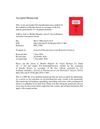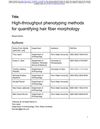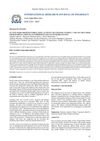 17 citations,
October 2002 in “Dermatologic Surgery”
17 citations,
October 2002 in “Dermatologic Surgery” Successful surgical hair restoration requires careful planning, precise execution, and proper aftercare, using techniques like follicular unit transplantation and correct hair angling for best cosmetic results.
 1 citations,
June 2018 in “Advances in Cosmetic Surgery”
1 citations,
June 2018 in “Advances in Cosmetic Surgery” PRP might help with hair growth and skin rejuvenation, but more research is needed to prove its effectiveness.
 April 2001 in “Dermatologic Surgery”
April 2001 in “Dermatologic Surgery” Michael L. Beehner proposed a standardized naming system for balding scalp areas to help hair restoration surgery.
 76 citations,
August 2018 in “International Journal of Cosmetic Science”
76 citations,
August 2018 in “International Journal of Cosmetic Science” Dermal Papilla cells are a promising tool for evaluating hair growth treatments.
 4 citations,
November 2018 in “Journal of Pharmaceutical and Biomedical Analysis”
4 citations,
November 2018 in “Journal of Pharmaceutical and Biomedical Analysis” Roselle flower extracts can protect against free radical damage in UV-irradiated antibiotics.
 August 2023 in “International journal of research in Ayurveda and pharmacy”
August 2023 in “International journal of research in Ayurveda and pharmacy” Garudan Kizhangu Ennai may effectively treat alopecia areata but needs more research to confirm its safety and effectiveness.
 March 2021 in “Egyptian Journal of Chemistry”
March 2021 in “Egyptian Journal of Chemistry” The herbal shampoo with Momordica charantia and Hibiscus Rosa-Sinensis is safe and promotes hair growth and scalp health.
 84 citations,
April 2005 in “Dermatologic Clinics”
84 citations,
April 2005 in “Dermatologic Clinics” Treatments for melanin disorders exist, but more effective options needed.
 83 citations,
July 2008 in “Current Opinion in Chemical Biology”
83 citations,
July 2008 in “Current Opinion in Chemical Biology” The document concludes that understanding sulfation biology is crucial for creating treatments due to its importance in biological functions and disease.
 284 citations,
February 2008 in “Pediatrics”
284 citations,
February 2008 in “Pediatrics” Chemicals and body size might change when puberty starts and progresses, but more research is needed to confirm this.
 8 citations,
September 2004 in “Contact dermatitis”
8 citations,
September 2004 in “Contact dermatitis” Avoiding dyed wigs and clothing improved severe allergic reactions in a woman treated with diphencyprone.
 1 citations,
November 2020 in “bioRxiv (Cold Spring Harbor Laboratory)”
1 citations,
November 2020 in “bioRxiv (Cold Spring Harbor Laboratory)” Quantifying hair shape is better than using racial categories for understanding hair characteristics.
 305 citations,
July 2016 in “International Journal of Biological Macromolecules”
305 citations,
July 2016 in “International Journal of Biological Macromolecules” Polysaccharides have many health benefits and are used in drugs, but isolating and purifying them is complex and requires careful methods.
 December 2024 in “International Journal of Health Sciences and Research”
December 2024 in “International Journal of Health Sciences and Research” Vitamin D is crucial for health, and deficiency can cause hair loss and other health issues.
 24 citations,
December 2014 in “International Journal of Molecular Medicine”
24 citations,
December 2014 in “International Journal of Molecular Medicine” Eclipta alba extract helps increase hair growth and decrease hair loss-related protein in mice.
 24 citations,
January 2014 in “The American Journal of Chinese Medicine”
24 citations,
January 2014 in “The American Journal of Chinese Medicine” The leaves of Platycladus orientalis have potential health benefits but require more research for safety and understanding how they work.
 December 2020 in “Nigerian journal of animal production”
December 2020 in “Nigerian journal of animal production” Dexamethasone can cause diabetes in rats, and Annona muricata bark extract may help lower blood sugar.
 December 2020 in “Daehanhanuihakoeji”
December 2020 in “Daehanhanuihakoeji” Rumex japonicas Houttuyn ethanol extract helps increase hair growth and protect against hair damage.

Sinsun-yukza-hwan extract promotes hair growth in mice.
 3 citations,
July 1987 in “Dermatologic Clinics”
3 citations,
July 1987 in “Dermatologic Clinics” Scalp reduction can treat severe hair loss, but success depends on scalp flexibility and it may cause complications like pain, infection, and cosmetic issues.
 November 2018 in “Journal of investigative dermatology, venereology and cosmetology”
November 2018 in “Journal of investigative dermatology, venereology and cosmetology” Biofield Energy Treatment, specifically The Trivedi Effect®, can potentially enhance hair growth by increasing the growth activity of human dermal papilla cells.
 85 citations,
March 2012 in “Revista Brasileira de Farmacognosia”
85 citations,
March 2012 in “Revista Brasileira de Farmacognosia” The genus Sophora has compounds with potential health benefits and could lead to new drugs, but more research is needed to understand their effects and safety.
 1341 citations,
January 2014 in “Cardiology Research and Practice”
1341 citations,
January 2014 in “Cardiology Research and Practice” Managing metabolic syndrome needs both lifestyle changes and medical treatments.
 1 citations,
December 2021 in “Pakistan biomedical journal”
1 citations,
December 2021 in “Pakistan biomedical journal” Eating certain seeds may help reduce symptoms of Polycystic Ovary Syndrome.
 January 2024 in “Open access journal of pharmaceutical research”
January 2024 in “Open access journal of pharmaceutical research” The herbal hair oil made from natural ingredients is safe and effective for treating hair loss.
 1 citations,
October 2018 in “International research journal of pharmacy”
1 citations,
October 2018 in “International research journal of pharmacy” Rampai leaves extract can significantly stimulate hair growth.
 84 citations,
February 2013 in “Clinica chimica acta”
84 citations,
February 2013 in “Clinica chimica acta” Hair mineral analysis might help diagnose diseases early, but standard methods are needed.
 65 citations,
May 2017 in “Advances in wound care”
65 citations,
May 2017 in “Advances in wound care” Toll-like receptors are important for wound healing, but can slow it down in diabetic wounds.
 April 2024 in “Journal of pharmacy & pharmacognosy research”
April 2024 in “Journal of pharmacy & pharmacognosy research” A compound from Calophyllum inophyllum L. leaf may help treat non-small cell lung cancer.
 January 2011 in “Springer eBooks”
January 2011 in “Springer eBooks” Eating a balanced diet with the right vitamins and minerals is important for healthy hair, but too many supplements can be harmful.





























